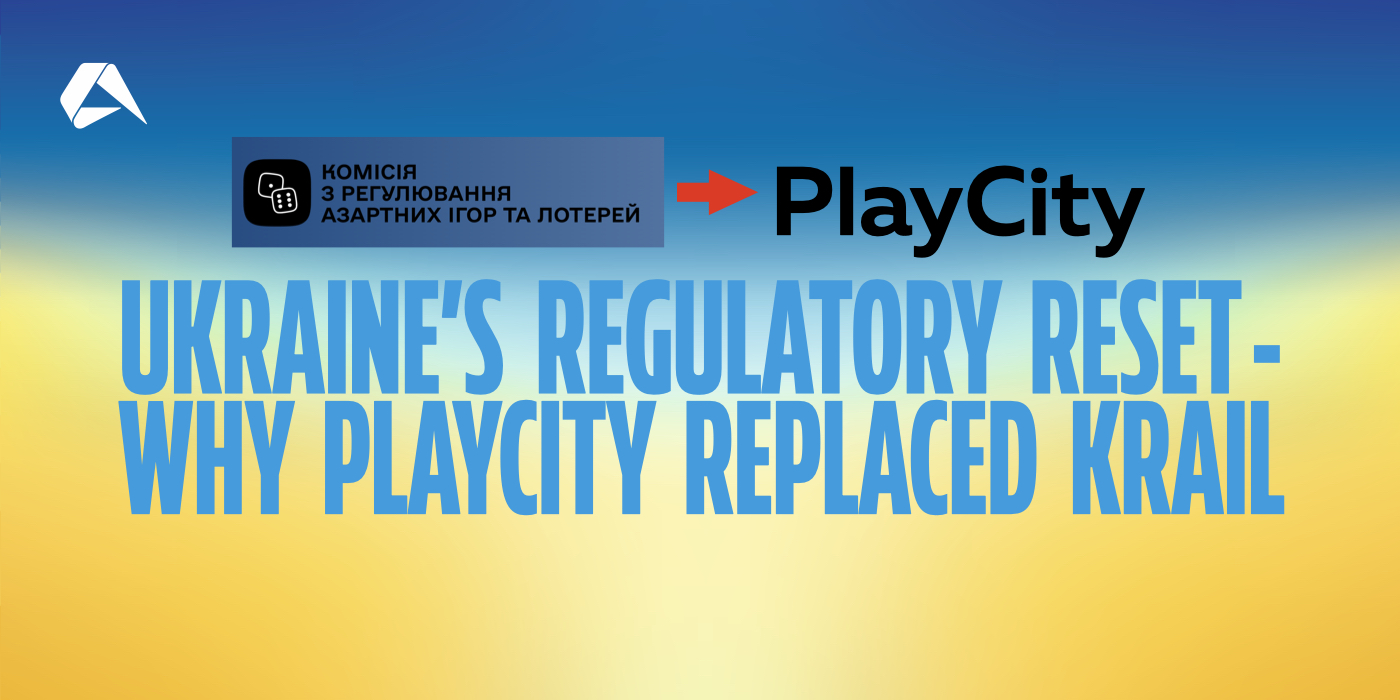When Ukraine re-legalised gambling in 2020, the goal was transformation—not turbulence. Fast-forward to 2025, and the Commission meant to realise that vision, KRAIL, has been swept aside. In its place came PlayCity, the nation’s new digital engine room for gambling oversight.
Is this a long-overdue reset or something far more ambitious? As Ukraine swaps human regulators for code, this article explores the changes that have occurred, what iGaming operators need to understand now, and why those insights may soon matter well beyond Kyiv.
DISCLAIMER
This information is not intended to be legal advice and is solely extracted from open sources. It should not be relied upon as a substitute for professional legal advice, and Altenar does not accept any liability for its use.
Ukraine’s Post-2020 Gambling Market
After more than a decade of prohibition, Ukraine took a decisive step in August 2020 by re-legalising gambling through Law No. 768-IX. The move wasn’t just about revenue. In essence, it was a strategic effort to bring under control a sector that had long operated underground, bring in tax income, protect consumers, and demonstrate openness to international investment.
The government’s vision was to create a legalised and regulated market to help close the door on illicit gambling while building a system aligned with European standards. Officials at the time positioned gambling reform as a win-win, capable of plugging fiscal gaps while offering safeguards for players and boosting Ukraine’s global economic profile.
Backed by President Volodymyr Zelenskyy, the law introduced a licensing regime for online casinos, betting shops, slot halls, and land-based casinos, as well as requirements for responsible gambling and anti-money laundering compliance. On paper, at least, it was a modern and ambitious reform.
But as the years that followed would show, turning that vision into a functioning regulatory environment would prove far more complicated than expected.
A Promising Start, Hampered by Red Tape
After official re-legalisation, the market witnessed a notable surge in interest from operators eager to capitalise on the new opportunities. Companies like Parimatch and Cosmolot were among the first to secure licences, signalling strong enthusiasm within the industry.
However, entering this newly-regulated market was all but straightforward. For industry operators, the financial commitment was substantial. Obtaining an online casino licence required a fee of approximately UAH 39 million (around $1.4 million in 2020) for a five-year term. Furthermore, operators were mandated to comply with stern anti-money laundering (AML) regulations and maintain a minimum authorised capital of UAH 30 million (≈ USD 1.1 million in 2020).
Technical requirements further complicated the situation. Online platforms were obligated to use certified gambling software that records all transactions and adheres to the technical standards set by regulatory authorities. Moreover, websites had to be registered with a .UA domain name and included in a special register maintained by the Ukrainian regulator.
While the potential of Ukraine's gambling sector was evident, these administrative and financial hurdles posed significant challenges for operators aiming to establish a foothold in the market.
KRAIL: A Regulator Stuck in Neutral
Hopes were high that regulation would bring order to a once-shadowy industry. The body entrusted with this duty was the Commission for the Regulation of Gambling and Lotteries, better known as KRAIL. Formed in September 2020, its mandate was clear on paper - to license operators, supervise compliance, and enforce player protection rules aligning with Law No. 768-IX.
KRAIL was envisioned as the gatekeeper to a newly regulated market, responsible for evaluating applicants, issuing licences, and establishing a framework of accountability. In theory, it was the anchor of Ukraine’s new gambling environment, tasked with building trust among international investors and rooting out illegality. But as the market grew, so did concerns about KRAIL’s performance. While the Commission held the reins of regulation, it often appeared unable to drive the sector forward. The gap between ambition and execution was beginning to show.
Achievements and Shortcomings
Achievements
Issuance of First Legal Gambling Licences Since 2009
KRAIL successfully launched Ukraine’s modern regulated gambling market by issuing the country’s first online and land-based gambling licences under the new law.
Development of Technical Licensing Procedures
The Commission established initial technical and procedural frameworks for licensing, including guidance on certified equipment, AML policies, and internal control systems. This laid the groundwork for compliance structures across betting, casino, and slot operations.
Cooperation with Law Enforcement and Regulatory Monitoring
KRAIL undertook enforcement activity alongside Ukrainian authorities to combat illegal operators. This included inspections of gambling venues and support blocking unlicensed websites as part of broader sanctions.
Shortcomings
Severe Delays in Licensing Due to Quorum Failures
One of KRAIL’s most persistent and damaging problems was its inability to convene meetings and approve licences due to vacant commissioner seats. This effectively paralysed the licensing process for months at a time.
Lack of Digital Infrastructure and Manual Workflows
Operators were frustrated by outdated processes, including reliance on paper submissions and limited access to digital licensing portals. This stood in stark contrast to Ukraine’s broader tech-forward ambitions.
Perceived Lack of Transparency
Despite its mandate, KRAIL was often criticised for vague procedures, unclear timelines, and obscure decision-making, creating confusion and regulatory uncertainty for local and international firms.
No Control Over Taxation or Policy Reform
KRAIL’s limited remit meant it had no authority to influence Ukraine’s inconsistent gambling tax regime. For example, the delayed adoption of Bill 2713-D left operators paying high licence fees plus a flat 18% GGR tax from 2023 onward.
Poor Communication with Industry Stakeholders
International operators and trade associations frequently cited a lack of dialogue and clarity from the Commission. This hindered confidence, delayed market entry, and led some to view Ukraine as high risk despite its promise.
The Public and Political Backlash
As the post-2020 gambling market took shape, support for the regulator grew noticeably fragile. Operators who had entered with optimism soon found themselves wrestling with red tape, licensing delays, vague procedures, and inconsistent timelines, which became common grievances. For businesses trying to plan market entry and launches or even maintain compliance, the lack of clarity became more than an inconvenience and bordered on a liability.
The discontent wasn’t limited to industry voices. International scrutiny followed, with figures such as the Dutch Minister for Legal Protection raising questions about Ukraine’s ability to enforce sanctions on unlicensed and Russian-linked operators.
By early 2024, the Zelenskyy administration had seen enough. Blaming wartime inefficiencies and institutional dysfunction, the government signalled its intent to scrap KRAIL entirely, not as a rollback but as a reboot. In summary, fixing the system was no longer optional. It had become a matter of state credibility.
Why KRAIL Was Dissolved
In 2023, KRAIL hit an operational wall. Several commission members resigned, with some reportedly called to military service, bringing decision-making to a standstill due to an incomplete board. No quorum meant no votes, and no votes meant no licences. For over a year, KRAIL couldn't process new licence applications or renew existing ones, causing a standstill in regulatory activities.
Ultimately, this meant that iGaming operators seeking entry into the Ukrainian market faced indefinite delays, and existing businesses operated in a climate of uncertainty. The absence of timely licensing decisions restricted the industry's growth and undermined confidence in the regulatory framework.
This paralysis came at a cost. Ukraine’s hopes of drawing international capital into a newly liberalised market began to fade. The structure meant to inspire confidence was instead undermining it. What started as an administrative delay had snowballed into an economic liability, prompting Kyiv to rethink its regulatory framework.
Ukraine’s Digital Push Leaves KRAIL Behind
By mid-2024, the disconnect had become too large to ignore since KRAIL had been effectively gridlocked for months. Government frustration began to boil over, especially as lost licensing revenue and growing compliance concerns made headlines.
As KRAIL stalled, the government’s broader transformation goals were accelerating. Ukraine’s Ministry of Digital Transformation had already made significant strides toward a unified e-government model primarily built around transparency, automation, and public trust. Against this backdrop, KRAIL’s paper-based procedures and vague institutional practices looked increasingly out of place.
This became apparent when the Digital Ukraine initiative, championed by the Ministry of Digital Transformation, began to clash openly with KRAIL’s paper-heavy procedures and sluggish response times. As Ukraine pushed forward with e-government reforms across sectors, KRAIL stood out as a regulatory body ill-suited to a digital-first approach.
In the end, the push to modernise was no longer just desirable. It had become politically and economically necessary. This mounting pressure culminated in legislative action, with the Verkhovna Rada adopting Law No. 9256-d to dissolve KRAIL, a decision formalised by President Zelenskyy in January 2025. This was followed by the creation of PlayCity, a digitally driven body, as its digital successor.
What Is PlayCity, And Why Does It Matter?
Aligned with the government’s attempt to reboot the regulatory framework for gambling in Ukraine, PlayCity emerged in early 2025 not as a conventional regulator but as a state-backed digital platform designed to handle licensing, supervision, and reporting through one centralised interface.
Spearheaded by the Ministry of Digital Transformation, the system reflects Ukraine’s broader shift toward automated, transparent governance. In other words, rather than replacing KRAIL with another bureaucracy, lawmakers opted to focus on infrastructure by introducing a tech-first solution aimed at cutting red tape and regaining operator confidence.
What Makes It Different?
At its core, PlayCity offers a structural break from past inefficiencies. Instead of relying on committee votes and in-person procedures, licensing requests are processed digitally through an integrated e-government interface. Applications are timestamped, tracked, and audited in real time, eliminating the notorious backlogs that plagued KRAIL.
In practice, this means that operators can submit documents, pay fees, and monitor status updates without third-party intervention. Oversight has also shifted. Not to another commission, but to a central executive authority tasked with enforcing rules through automated controls and pre-defined compliance metrics. This digital-first model aims to close the enforcement gap while regaining investor trust. To be clear, PlayCity doesn’t just represent a change in personnel, it means a wholesale change in how gambling is governed in Ukraine.
KRAIL vs PlayCity Comparison Table
| Category | KRAIL | PlayCity |
|---|---|---|
| Regulatory Structure | Commission-based regulatory body | Digital platform for licensing and oversight |
| Decision-Making Process | Required commission votes for approvals | Automates workflows with system-based decisions |
| Application Tracking | No public tracking or timeline visibility | Real-time digital tracking of application status |
| Submission Method | Paper-based, in-person or postal document submission | Fully electronic, centralised document handling |
| Quorum Requirements | Dependent on a fixed number of commissioners | Operates independently without quorum requirements |
| Licence Issuance Timeframes | Often delayed due to administrative bottlenecks | Structured, digital timelines to streamline processing |
| Transparency Tools | Limited visibility into decisions or timing | Timestamped and logged actions accessible in the user portal |
| Accountability Chain | Answerable to internal commission hierarchy | Overseen by the central executive body and Ministry of Digital Transformation |
| Fee Collection System | Manual payment procedures | Integrated automated payment and invoice system |
| Compliance Monitoring | Depended on manual inspections | Embedded compliance protocols within the platform |
| Technical Infrastructure | Built on legacy bureaucratic systems | Part of Ukraine’s e-government transformation initiative |
The industry’s response so far
But can a platform fix what policy couldn’t? That’s the question many operators are quietly asking as PlayCity comes online. For local licensees who battled delays under KRAIL, there’s guarded optimism. “The shift to digital is promising, especially if it reduces human interference in licensing,” one Ukrainian operator told a leading Regulatory Intelligence platform off record. Faster turnaround times and simplified application flows are broadly welcomed.
But for international brands considering re-entry or entry for the first time, the mood typically remains watchful. A representative from a major European sportsbook described the current state as “a step forward in theory, but the real test will be consistency in execution”. The absence of public documentation around processes, enforcement priorities, or compliance thresholds has prompted a wait-and-see position among many legal and regulatory teams.
As EGR Intel noted in its March 2025 coverage, industry sentiment hinges less on the tech and more on trust. Operators want to see whether PlayCity offers predictability and not just digital form-filling. Until then, optimism remains tempered by experience.
The Implications for International Operators
For international operators eyeing Ukraine’s market, it would be prudent to say that PlayCity introduces promise but not yet predictability. The government’s ambition to replace bureaucratic procedures with digital tools has been broadly welcomed. A Kyiv-based compliance advisor described the reform as a chance to wipe the slate clean and start from a position of clarity. However, such clarity depends much on the execution.
Key questions remain: Will the licence vetting process be faster under PlayCity? Will previous documentation still be valid? Will requirements differ for domestic and foreign firms? As of Q1 2025, these details remain unanswered. What is clear, nonetheless, is that Ukraine is no longer tolerating regulatory paralysis. The system is moving, and operators not keeping pace risk being sidelined.
Expected Changes in 2025
Building upon the earlier discussion on Ukraine’s regulatory overhaul, Ukrainian President Volodymyr Zelenskyy signed Law No. 9256-d in January 2025, initiating what has now become one of the most consequential overhauls to the country’s gambling regulation since the 2020 legalisation effort.
While the move was pitched as a means to streamline licensing and tighten supervision, it also signalled a shift in regulatory tone. The law imposes sharper compliance expectations, enhanced financial scrutiny, and a tougher stance on gambling-related harm, particularly during wartime.
The regulatory overhaul introduced by Law No. 9256-d, combined with broader enforcement trends, introduces a new layer of expectations for gambling operators. Some obligations build on existing compliance structures, while others represent new or evolving requirements that international operators should now factor into their risk management strategies.
-
Enhanced Real-Time Reporting Obligations
Operators must now implement systems capable of real-time data submission to regulatory bodies, ensuring immediate transparency in gaming activities.
-
Integration with Ukraine’s Financial Monitoring Authority (SFMS)
A closer collaboration with the State Financial Monitoring Service is now required, meaning operators must align their financial reporting and anti-money laundering protocols with SFMS standards to combat financial crimes effectively.
-
Scrutiny of Russian-Affiliated Entities
Entities with ties to Russian-origin technology or founders are subject to intensified examination, reflecting geopolitical tensions and efforts to safeguard national security interests.
-
Taxation Framework
As of early 2025, Ukraine’s gambling tax structure remains under legislative review. Currently, operators are subject to an 18% GGR tax, which was reinstated by Bill No. 8079 in January 2023. However, further reforms are being debated. Draft Bill No. 2713-d proposes a unified 10% GGR tax across all gambling verticals and introduces an 18% corporate income tax on net profits. If adopted, this could potentially raise the overall tax burden for operators.
-
Tighter Advertising Regulations
New amendments introduce a near-total ban on gambling advertising, with limited exceptions. Online advertising must not target consumers under 21, and television ads are restricted to airing between 11 pm and 6 am. Sponsorship opportunities are limited to sports.
-
Increased Financial Transparency
Operators must comply with more stringent financial reporting requirements to ensure transparency and prevent illicit activities.
-
Mandatory Responsible Gambling Measures
PlayCity is likely to enforce stricter responsible gambling protocols, including self-exclusion programs and limits on betting amounts, to protect consumers.
-
Regular Audits and Compliance Checks
Operators can anticipate more frequent audits and compliance checks to ensure adherence to the new regulatory framework.
-
Digitisation of Licensing Processes
The new agency aims to digitise gambling business licensing to improve procedures and reduce bureaucratic hurdles for operators.
Final Thoughts on Ukraine’s Regulatory Reset
Ukraine hasn’t just swapped regulators. In many respects, it has rewritten the rules of engagement with industry operators. The move from KRAIL to PlayCity fundamentally represents a shift in regulatory philosophy. PlayCity is not a traditional authority with desks and departments. It’s a digital interface and a platform that automates compliance, licensing, and oversight in line with the government’s broader ambitions. For operators, this introduces a different kind of challenge: one of understanding how to thrive in a system where the rules are hard-coded into software, not shaped through negotiation.
The opportunity, however, is real. A more efficient system could reduce wait times, increase transparency, and open doors previously jammed shut. But the margins for error will shrink. Success in this environment may depend less on legal interpretation and more on system compatibility, agile compliance infrastructure, and the ability to read Ukraine’s political and regulatory intentions in real time.
For global operators, Ukraine could become a proving ground with its introduction of a model for how tech-forward regulation might look in other emerging or evolving jurisdictions. Conversely, it may also show what’s lost when flexibility is sacrificed for automation.
What lessons can international iGaming operators learn from this initiative? Engage early, invest in localisation, and don’t mistake digitisation for deregulation. Ukraine’s experiment may well set the tone for a fresh approach to mark regulations globally, but only for those prepared to keep pace with policy as it’s written in real time.
Either way, what happens next in Ukraine will likely not stay in Ukraine, and smart operators would do well to act accordingly.
Ukraine PlayCity System is changing the game. Is your platform playing by the new rules?
Discover how Altenar’s compliance-ready architecture positions operators for success in PlayCity and beyond. Book your demonstration today to learn how we future-proof your iGaming business.
DISCLAIMER
This information is not intended to be legal advice and is solely extracted from open sources. It should not be relied upon as a substitute for professional legal advice, and Altenar does not accept any liability for its use.













